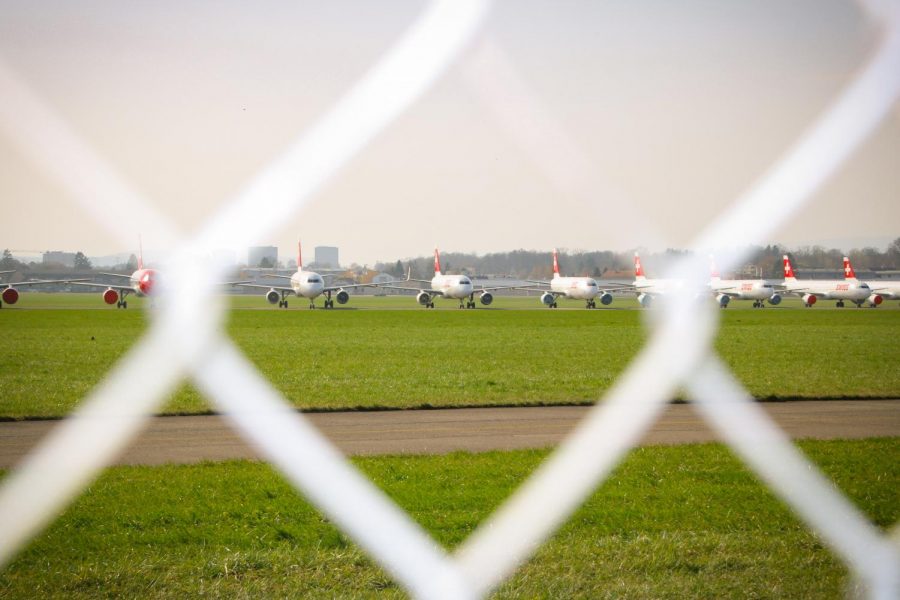Grounded Planes and Lost Revenue: The Coronavirus Pandemic’s Impact Upon the Aviation Industry
Pictured are grounded Swiss planes during the Coronavirus pandemic at the military airport of Dübendorf, Switzerland.
Due to the circumstances surrounding the ongoing Coronavirus pandemic, most commercial flights have been cancelled. When the pandemic began in America in February 2020, it marked the beginning of a difficult time for the aviation industry. People started losing their jobs and companies began going downhill.
Coronavirus spreads quickly and physical isolation is the only way to slow it down. But this goes against what the aviation industry does, connecting people who are separated by land or ocean.
In February and early March 2020, the United States responded to the Coronavirus pandemic by limiting travel to and from China. As a result, international flights to China were cancelled due to fear of contracting COVID-19. As a communist country, China owns most of their airlines, which means that these Chinese airline companies would be mostly unaffected by the pandemic, as the government would be absorbing most of the financial damage.
As the virus spread to South Korea, Iran, and then Italy, flights were soon cancelled in greater numbers. This was not enough, however, to halt the global spread of COVID-19. Italy’s position in the European Union posed a unique problem. The Coronavirus could easily continue to pass through Italian borders up north and then spread to central and northern Europe. As Europe is one of the most profitable places for the aviation industry, the grounding of most commercial flights put the continent’s airlines on life support.
Europe’s aviation giants are the Lufthansa Group and IAG. As Europe was being decimated by the Coronavirus pandemic with grounded flights, these giants suffered great financial hardship because both domestic and international travel had been halted. Europe would quickly fall into an even deeper economic chasm. President Donald Trump’s speech on March 11th, 2020 and his planned response to the Coronavirus included banning all foreign travel from Europe. This was considered by many to be a radical move, as Europe and America are very interlinked economically and culturally.
After this travel ban, America’s aviation giants (Delta, American Airlines, and United Airlines) also fell into a financial crisis. Domestic and international travel in the United States fell to very low levels. United Airlines announced a 70% reduction in the number of flights and predicted a load factor (number of passengers) to be about 20-30% of their pre-pandemic levels. Nearly every European airline had negative bookings, meaning that they refunded more tickets than they sold. Due to the cancellation of flights, many airlines decided to limit themselves to domestic travel or simply shut down for the time being. The smallest airlines have been hit the hardest, as they do not have cash reserves on hand.
Airlines rely on data and past statistics in order to get the highest revenue from a flight. But since we are living through a novel Coronavirus pandemic, global in scope, the airlines have no data and no idea of what the demand patterns will be after the Coronavirus pandemic has ended, as the last pandemic of the same magnitude, the 1918 H1N1 flu virus pandemic, occurred when the aviation industry was in its infancy.
During the past few months, the aviation industry has been trying to stabilize their balance sheets. Anchorage, Alaska has become an important cargo hub, used to distribute essentials and supplies during the Coronavirus pandemic. On October 29th, 2020, a spokesman for Airbus announced that they are making progress in their efforts to stabilize their balance sheets in the wake of continuing disruption from the Coronavirus pandemic. Consolidated revenues for the nine months ending on September 30th, 2o20 were 35 percent down from the same period in 2019 at €30.2 billion ($35.5 billion). Consolidated adjusted earnings across the group showed a €125 million ($146.3 million) loss.
The CEO of Ryanair, Europe’s largest airline, Micheal O’Leary, said that in spite of the industrial slump, they are committed to the Boeing 737 Max and are contemplating placing an order for more of them, during their annual financial report presentation. The CEO of Boeing, Dave Calhoun, said in an interview that he expects 737 Max deliveries to resume in Q4 after rigorous certification and validation flights with multiple aviation authorities, such as Transport Canada and the EU Safety Agency. United Airlines, at their Q3 financial report presentation, poised themselves as a leader for the resurgence of air traffic.
Airlines rely on data and past statistics in order to get the highest revenue from a flight. But since we are living through a novel Coronavirus pandemic, global in scope, the airlines have no data and no idea of what the demand patterns will be after the Coronavirus pandemic has ended, as the last pandemic of the same magnitude, the 1918 H1N1 flu virus pandemic, occurred when the aviation industry was in its infancy.
Samiul Howlader, a Staff Reporter for the 'The Science Survey,' is grateful to work on this wonderful journalism team. Howlader finds that being matter...

